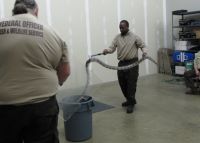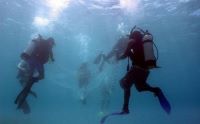Avian Wright, a 2008 alumnus of the University of Arkansas at Pine Bluff (UAPB) Department of Aquaculture and Fisheries, does not have a typical job. Some days, he would like to enjoy a normal day in the office. But a phone call related to the more exotic aspects of his career could instantly change his agenda.
“There are days when I think I will be doing paperwork but receive a call asking for assistance catching an escaped 4-foot Savannah monitor lizard running down the warehouse belt,” Wright said. “That animal isn’t illegal in the U.S., but it was a pet someone shipped incorrectly.”
As supervisory wildlife inspector for the U.S. Fish and Wildlife Service, Wright oversees international operations at the International Port of Memphis’ inspection station. His responsibilities include facilitating the legal trade of wildlife, flora and fauna.
“We specialize in the interdiction of illegal wildlife and their commodities being imported into or exported from the U.S.,” he said. “By interdiction, we mean stopping non-declared shipments traveling by air, rail, truck or ocean cargo from entering the country.”
Wright said the case of the incorrectly shipped monitor lizard is just one of many colorful stories from his career.
“I’ve interdicted smuggled box turtles that were manifested as baby formula — yes, baby formula,” he said. “Imagine 20 cans of Enfamil sitting in front of you. Once you open the cans, they are
jam-packed with socks, but not just any socks. These socks are moving. Inside are Mexican box turtles plucked from a small range somewhere in Mexico, now destined for soup or the pet trade in Asia.”
Wright said the most enjoyable part of his career is making a difference in ecosystems around the world. He finds removing smuggled animals or plants from illegal trade very rewarding.
“Here in Memphis, we do a ton of interdiction work,” he said. “It’s kind of like hunting every day. One of my favorite quotes comes from the movie ‘Forrest Gump.’ The famous line is, ‘Life is like a box of chocolates. You never know what you’re gonna get.’ That’s my everyday reality as a wildlife inspector.”
Besides interdiction, Wright said a large part of his job involves compliance.
“Not everyone who ships wildlife or their products is doing so with criminal intent,” he said. “We train brokers and the import-export community on the proper ways to legally move their items and the laws that pertain to them.”
Other daily tasks revolve around ensuring his staff has everything they need to perform efficiently.
“There are several great challenges with my job,” Wright said. “One involves staffing. It’s hard to recruit and maintain good people. The work is hard — more mentally than physically — and the hours are sometimes long. Then there are the job duties themselves.”
“We work to find new trafficking and smuggling routes daily,” he said. “Criminals have all day to fathom unique and sophisticated ways to smuggle wildlife, plants and their products. We are continuously
evolving along with the trade. We also have to keep up with the laws we regulate. At times, depending on the day, we need to act as the inspector, law interpreter or broker.”
Since 2021, Wright has been part of the USFWS Regional Directors Gateway Team.
“Our goal is to ensure students coming in under special hiring authorities are given every opportunity possible to land jobs within the USFWS,” he said. “I’m working on extending one of our programs to UAPB.”
Before his tenure at USFWS, Wright worked as a resource technician for the Missouri Department of Conservation (MDC). At the time, he worked under Christopher Kennedy, a UAPB alumnus of fisheries biology who served in a number of roles for MDC before being named secretary of the Kansas Department of Wildlife and Parks.
“My duties consisted of pond management, sampling eastern hellbenders and monitoring the southeast Missouri alligator gar reintroduction program,” he said. “We stocked gar into the Mingo National Wildlife Refuge swamps in an effort to restore these once thriving giants. We studied their movements, growth and feeding habits.”
The story of how he ended up at USFWS is one of Wright’s favorites to tell. He said it shows that God puts people in certain places for a reason and that destiny may be real. At the time, though he enjoyed his job in Missouri, he felt he needed a new opportunity for growth.
“It just so happened that the annual UAPB Career Fair was coming up, and Chris Kennedy reached out to my then-supervisor asking if I could attend to represent the Missouri Department of Conservation,” he said. “While checking in at the hotel, a lady named Angel noticed my MDC uniform and asked if I liked my job, if I was happy there.”
Wright explained that he loved the work but feared there was no room for growth.
“Angel then told me she had a friend with the U.S. Fish and Wildlife Service and that she could forward him my resume,” he said. “Before I could finish my duties in Pine Bluff and make it back to Columbia, Missouri, I received a phone call from Mr. Zack Green, another UAPB alumnus.”
Green, a special agent with the USFWS, told Wright he would be a great asset to the organization and asked him to consider a role as a wildlife inspector. Upon reading the job description, Wright initially had some doubts.
“Wearing a badge, learning new things other than ‘fish squeezing’ and starting over in a new organization brought fears,” he said. “I prayed on them and decided to take the leap. Oh, am I glad I decided to step out of my comfort zone. Now I consider USFWS my home. Since landing here, I haven’t had the urge to look any further.”
Wright said an education at the UAPB Department of Aquaculture and Fisheries (AQFI) prepared him well for his career. He felt that he was held accountable and constantly challenged.
“The curriculum I learned while at UAPB-AQFI was a pillar,” he said. “When I left UAPB in the summer of 2008, I felt like I could identify any fish in the world if I had a microscope and dichotomous key. UAPB’s professors gave me confidence in myself and the knowledge I was taught.”
Wright said Dr. Steve Lochmann, professor of fisheries management and ecology, was especially influential.
“Dr. Lochmann is a man of many words, and you come to realize that he doesn’t speak those words unless there is substance behind them,” he said. “His knowledge in fisheries and the way he made it fun to learn were motivating.”
He credits Dr. Lochmann with constantly providing students with opportunities for development.
“For example, one summer we sampled fish in the streams of the Ozark Mountains with the United States Geological Survey and spent some time at various hatcheries rearing all sorts of fish,” he said. “He also flew us to Puerto Rico to sample saltwater fish. Dr. Lochmann believed in us, and he was not afraid to provide constructive criticism when needed. Professors like him make all the difference.”
Wright originally chose to major in aquaculture and fisheries because of his lifelong love for the outdoors.
“I think I love fishing itself more than the outdoors,” he said. “Once I realized that I could make a living conserving and improving the habitat of the fish and game I so adored, I was in it for the long haul.”
Wright said it was his father who originally got him interested in fishing.
“He was the first one to put a rod and reel in my hand,” he said. “He took me fishing just about every weekend and sometimes during the week.”
Sadly, Wright’s father died of a heart attack in 2002 when Wright was 16.
“Now I’m a 16-year-old young man who has just lost one of the most predominant figures in his life while heading into one of the most crucial points in a young man’s life.”
Wright credits his mother with keeping his development and education on track during that difficult time. She regularly researched careers and educational opportunities for him. One day, she came across an article about a full-ride scholarship offered by the UAPB Department of Aquaculture and Fisheries.
“I can remember her placing this article in front of me during my senior year and saying, ‘You’re going to apply — you may not get it, but at least you can say you tried,’” he said. “I applied and received that full-paid scholarship. The rest is history.”














